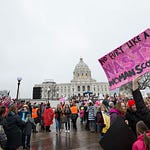Since joining the Minnesota Star Tribune in 2009, Eric has covered the Twin Cities metro area, the city of Minneapolis, the state Legislature and Congress. Prior to becoming a columnist, he oversaw the Star Tribune’s Curious Minnesota project and helped create the narrative podcast “Ghost of a Chance.” He is a graduate of the George Washington University and lives in south Minneapolis. To follow Eric’s work by email, sign up for his newsletter at startribune.com/roperalert.
Introduction
City elections are November 4, and like many of you, we’re watching closely. In our interview with Eric Roper, neither of us could predict outcomes, but early voting has been robust—especially in Ward 6, Precinct 3, where 25% of registered voters have already cast ballots. Ward 6 overall has seen nearly double the early votes of any other ward (1,944 so far, compared with 970 in Ward 3).
Here in Ward 8, our mailbox has filled up too: four mailers for Josh Bassais, one for Soren Stevenson. One neighbor even wrote a letter about their mayoral pick and hand-delivered it with their kids—a reminder that people are paying close attention this cycle.
What does it all mean? At the very least, there’s genuine energy in this election. If you’re still undecided, what’s the key piece of information you’re waiting for?
In our conversation with Eric Roper, we touched on several themes shaping the race—particularly the dynamics in Wards 7 and 10, as well as the broader “sides” that have formed. We both agreed that the core issues of housing, public safety, and economic recovery carry far more nuance than the headlines suggest.
This Week at Better Minneapolis
It’s a full week ahead, and we’re grateful for your readership. If you enjoy these interviews, please consider a paid subscription or share the newsletter with friends and family—your support keeps this work going.
Upcoming interviews include:
Cathy Abene, Park Board President and Candidate for District 6
Jim Meyer, Candidate for City Council, Ward 11
Bob Fine, Candidate for Board of Estimate & Taxation
Elliott Payne, President of Minneapolis City Council and Ward 1 Candidate
Tane Danger, recent mayoral debate moderator and co-founder of Danger Boat Productions
You can find our full archive of candidate conversations on our @BetterMinneapolis YouTube Channel, with podcast versions available on Apple Podcasts and Spotify.
A special thanks to our friends at Speak MPLS, where we record most of our podcasts. They manage public access TV and produce Elect MPLS, a YouTube series featuring short videos from city council and mayoral candidates—another great way to learn before you vote.
We’re planning to host our paid subscriber happy hour on Thursday, October 30. We’re eager to hear readers’ predictions and what has stood out to you in this election. If you have a location suggestion, please email us.
Interview Summary
In a wide-ranging interview for Better Minneapolis, columnist Eric Roper reflected on his 16-year journey at the Star Tribune and his evolving focus on urban issues. Roper, who began as a political reporter, became deeply interested in the fabric of Minneapolis while covering City Hall. That curiosity led to his current role as a metro columnist, where he explores how history, housing, and policy intersect to shape life in the city. In his podcast, Ghost of a Chance, he examines racial history and segregation in Minneapolis through the story of Harry and Clementine Robinson, a Black couple who lived in Roper’s south Minneapolis home a century ago.
Roper explained that Ghost of a Chance grew out of his discovery of Mapping Prejudice, a University of Minnesota project that documents racial covenants, which once barred Black residents from owning homes in much of the city. Investigating the Robinsons’ lives uncovered the systemic efforts to remove Black families from southwest Minneapolis in the early 20th century, pushing them eastward toward 38th Street and Fourth Avenue—an area later fractured by the construction of Interstate 35W. The podcast connects these patterns of exclusion to today’s racial and economic disparities, offering listeners both historical depth and modern relevance. Roper described the process as “a five-year chapter” of his life that taught him as much about the city’s enduring inequities as about the resilience of its communities.
The conversation shifted to contemporary issues, especially the housing debate dominating local elections. Roper discussed the complex divide between renters and landlords, the racial homeownership gap, and policies like rent control and the proposed Tenant Opportunity to Purchase Act. He noted that while these issues are politically charged, they reflect deeper questions about equity, economic opportunity, and the role of government in shaping the housing market. Minneapolis, now a majority-renter city, is grappling with how to balance tenant protections with incentives for investment and development—a balancing act that continues to define the city’s political identity.
Crime and public safety were also central topics. Roper spoke about his recent column “Doomsday Docs,” which challenges the extremes in how residents perceive Minneapolis—either as a “hellscape” or as entirely safe. He acknowledged the reality of vandalism, addiction, and public disorder in certain neighborhoods, but emphasized the need for nuance and empathy in how these problems are discussed. The city, he argued, is not beyond hope; its livability and civic spirit remain strong. What’s needed, he suggested, is a sustained focus on the underlying issues—mental health care, addiction treatment, and smarter public safety responses—that shape everyday life more than any single news headline.
In closing, Roper reflected on the evolution of city politics. Compared with past elections, he said, today’s debates center less on infrastructure and growth and more on relationships—how elected officials can collaborate despite deep ideological divides. He stressed the importance of restoring trust between businesses, government, and communities, and fostering dialogue that allows for creative problem-solving without fear of political backlash. Ultimately, Roper’s insights—rooted in both history and firsthand observation—offered a reminder that Minneapolis’s challenges are layered but not insurmountable. The city’s future, he implied, depends on its willingness to learn from its past while embracing a shared commitment to progress.










